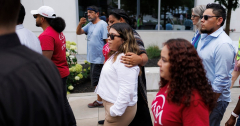A Salvadoran national whose mistaken deportation spurred national outcry in the United States will remain in jail for now, as lawyers discuss how to prevent him from being removed from the country a second time.
On Wednesday, Kilmar Abrego Garcia was set to be released from pre-trial custody without having to post bail. He is being held in detention in Nashville, Tennessee, on criminal charges of human smuggling.
The administration of President Donald Trump had sought to stop his release, deeming him to be a flight risk.
But US District Judge Waverly Crenshaw upheld a magistrate judge’s earlier decision finding that Abrego Garcia was eligible to walk free.
However, in an unexpected twist, lawyers on both sides argued that, if Abrego Garcia were released, he risks being taken into the custody of Immigration and Customs Enforcement (ICE) for a second deportation.
That would deprive Abrego Garcia of the chance to defend himself against the charges, which he has denied. And lawyers for the government argued that it would also scuttle their criminal case against him.
Judge Crenshaw noted in a written decision that, since it is the government’s choice whether or not to deport Abrego Garcia, the situation appeared to be a case of the executive branch doing “injury on itself”.
“If deported, the Government argues, the Department of Justice will be deprived of the opportunity to pursue its criminal charges against Abrego,” Crenshaw wrote.
But, he added, “it is the Executive Branch’s decision that places the Government in this predicament.”
Ultimately, it was decided that Abrego Garcia would remain in custody while lawyers sparred over whether they could prevent Abrego Garcia’s deportation if he were released to await trial.
A high-profile case
Abrego Garcia appeared at the Wednesday hearing wearing an orange jail-issued T-shirt and a headset to listen to the proceedings through a Spanish interpreter.
It was the latest chapter in an ongoing fight between Abrego Garcia and the Trump administration over whether he would be allowed to stay in the US.
According to his lawyers, Abrego Garcia fled El Salvador as a teenager to avoid gang violence, arriving in the US around 2011. He has lived for more than a decade in Maryland, where he and his American wife are raising three children.
In 2019, a judge granted him a protection order that barred his removal from the US.
But on March 15, Abrego Garcia was swept up in the immigration raids being conducted as part of President Trump’s mass deportation campaign.
He and more than 200 other Venezuelans and Salvadorans were accused of being gang members, and they were deported to El Salvador.
Many of the men were sent to the Centro de Confinamiento del Terrorismo, or CECOT, a maximum-security prison for those accused of terrorism. But advocates for the deported





